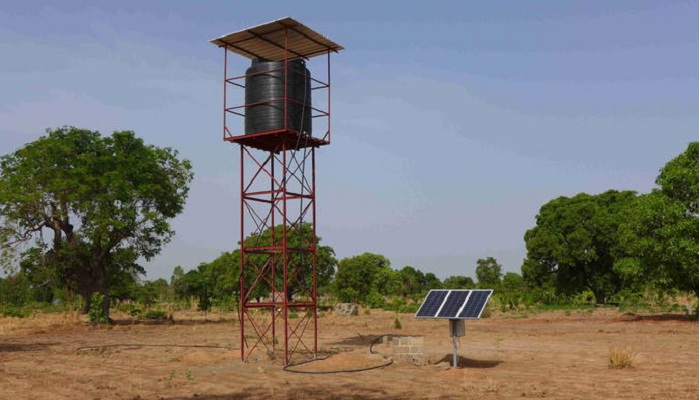Global water consumption will double by 2030. And yet even today, 2.1 billion people worldwide don’t have access to clean drinking water. Current photovoltaic-based solutions make possible the transport, desalination and disinfection of water even in rural and off-grid locations.
At Intersolar Europe, the world’s leading exhibition for the solar industry, taking place in Munich from May 15 to 17, 2019, the special exhibit Water for the World will showcase the manifold solutions for supplying drinking water offered up by photovoltaics.
According to the 2018 UN World Water Development Report, 2.1 billion people worldwide don’t have access to clean drinking water, and 3.6 billion people (almost half of the world’s population) live in areas which are threatened by water shortages for at least one month of the year. This number is expected to rise to 5.7 billion people by 2050 on account of climate change and general population growth – factors which have led the UN to forecast a 100% increase in global water consumption by as soon as 2030. Water crises have ranked among the top 5 risks in the past eight annual World Economic Forum Global Risks Reports.
There is a global need for more sustainable water management, more efficient use of water, more equitable distribution, and maximum decarbonization of water collection and treatment as part of international climate conservation efforts.
Water treatment and transport by means of solar power
PV-supported systems also present interesting opportunities for the desalination of brackish and salt water, for instance via reverse osmosis. In Witsand, South Africa, an installation was recently put into operation which can either run off-grid on pure solar energy or be coupled with the local utility grid system. With 66 kilowatts of power, it can produce about 100 cubic meters of clean water per day.
With its REvivED water project comprising ten companies and research institutes from six European countries, the EU is testing electrodialysis as a viable option for the desalination of salt and brackish water. Water disinfection systems, too, can also be powered by solar energy. The most commonly available systems are off-grid water treatment systems that rely on a combination of UV disinfection and solar energy.
Solar-powered pumping systems offer another invaluable approach to drinking water supply and agricultural irrigation in sunny and arid rural regions. Solar pumps are typically operated off-grid, sometimes coupled with the general utility grid or integrated as part of a mini-grid supported by renewables. According to Joachim Went, project leader at the Fraunhofer Institute for Solar Energy Systems ISE, “a rather large global market” has established itself for PV pumping systems, which themselves are considered “an advanced technology,” particularly those generating up to 5 kilowatts (kW). Photovoltaics can do a lot in this area, particularly as prices continue to fall.
Information on current branch solutions will be available at Intersolar Europe’s special exhibit Water for the World located at booth B3.151, co-organized by Raach Solar GmbH and Grundfos GmbH. The organizers will be exhibiting an autonomous water treatment plant powered by photovoltaic energy and suitable for any location lacking access to clean water. The installation performs the entire process of water pumping, treatment and purification, storage, distribution and management. By using the AQtap intelligent water ATM, customers will have the opportunity to decide for themselves how much water they will consume and can pay for their needs in advance. Not only does AQtap showcase an interesting application of photovoltaics in water treatment – particularly for non-governmental organizations (NGOs) and municipal water utilities – it also represents a compelling business model.
For more information, please visit:
www.intersolar.de/en
www.TheSmarterE.de/en
Intersolar Europe
Intersolar Europe is the world’s leading exhibition for the solar industry, taking place annually at Messe München in Munich, Germany. Under the motto “Connecting solar business,” it brings together people and companies from around the world with the aim of increasing the share of solar power in our energy supply.
Intersolar Europe focuses on photovoltaics, solar thermal technologies, solar power plants, grid infrastructure, and solutions for the integration of renewable energies. Since its founding, it has become the most important meeting point for manufacturers, suppliers, distributors, and service providers in the solar industry. The accompanying conference consolidates selected exhibition topics and showcases international markets, large- scale power plants, financing, and pioneering technologies.
With over 27 years of experience, Intersolar has the unique ability to bring together members of the solar industry from across the world’s most influential markets. Intersolar exhibitions and conferences are held in Munich, San Francisco, Mumbai, Bangalore, Mexico City, São Paulo, and Dubai. These global events are complemented by the Intersolar Summits, which take place in emerging and growing solar markets worldwide.
ees Europe, the continent’s largest and most international exhibition for batteries and energy storage systems, will take place in parallel to Intersolar Europe for the sixth time in 2019. The two exhibitions are complemented by Power2Drive Europe and EM-Power. Power2Drive Europe is an international exhibition dedicated to charging infrastructure and e-mobility, while EM-Power is the exhibition for intelligent energy use in industry and buildings. All four exhibitions are held at The smarter E Europe – the innovation hub for new energy solutions.
For more information on Intersolar Europe, please visit: www.intersolar.de/en





































